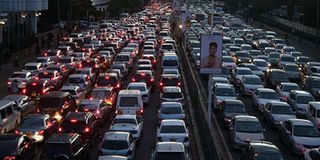The peculiar habits of Kenya’s middle class parents

Traffic gridlock along University Way, Nairobi, on December 3, 2018. Matatus were barred from entering the CBD; but the ban was later lifted. PHOTO | DENNIS ONSONGO | NATION MEDIA GROUP
What you need to know:
- When Sonko last Monday denied public service vehicles entry to the central business district, the middle class brought out nearly all their personal cars to the roads, getting the city into a gridlock.
- The self-entitlement, the unrealistic expectations and the hypocrisy with which they tend to approach the public debate around the annual Form One selection are simply inexcusable.
Michael Joseph, the former Safaricom CEO, once blamed Kenyans’ peculiar calling habits for the telecoms operator’s then regular technical hitches.
The reference to Kenyans was, of course, too broad given the fact that Safaricom’s calling rates were hardly affordable for a large majority of the population a few years ago.
Mr Joseph most probably had in mind the Kenyan middle class — a demographic peculiar in its habits in more ways than one.
When Nairobi Governor Mike Sonko last Monday denied public service vehicles entry to the central business district in a thoughtless plan to decongest it of vehicular traffic, the middle class brought out nearly all their personal cars to the roads, getting the city into a gridlock.
When then Governor Evans Kidero in 2013 doubled parking fees hoping some motorists would decide to leave their personal cars home, the middle class folks appeared to call his bluff by taking up all the parking space available the next day.
EDUCATION
But nothing, perhaps, demonstrates the peculiar habits of the Kenyan middle class better than the lofty educational aspirations parents in this income group have for their children.
Just about everyone here wishes his or her child were admitted to one of the few elite public secondary schools upon sitting the Kenya Certificate of Primary Education (KCPE) examination.
No one can begrudge such parents their dreams, and they no doubt mean well for their children.
But the self-entitlement, the unrealistic expectations and the hypocrisy with which they tend to approach the public debate around the annual Form One selection are simply inexcusable.
It is noteworthy that when some of the middle class folks launch into lamentations their children having been locked out of national schools, they mean the traditional 17 that enjoyed that status for about three decades until the government upgraded another 86 a few years back.
Others have in mind the national schools in Nairobi and its environs where they can occasionally show off their cars and indulge their children on Parents’ Day.
ADVISE
Yet the reality is that even the current 103 national schools can only admit so many students.
Out of the about 964,000 candidates that sat this year’s KCPE exam, only 31,000 were selected to join those schools. Under the equitable selection system adopted by the government, a candidate gets to picks only one school from the cluster of the traditional 17 national schools.
This means chances of one missing out are high if he or she is from an urban sub-county or a private academy which would typically register a high-pass rate.
One would expect responsible parents would help their children cope with a small setback like this one by letting them know they can still get a decent education in the other national school they have been admitted to.
Well, that is clearly too much to ask of the peculiar Kenyan middle class parent!





